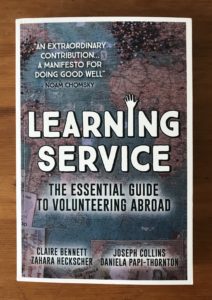From service learning to learning service: an interview with Claire Bennett

Claire Bennett is one of the co-authors of the new book Learning Service: the Essential Guide to Volunteering Abroad with Zahara Heckscher, Joseph Collins, and Daniela Papi-Thornton. Stahili’s Education and Advocacy Director, Rob Oliver, recently spoke to Claire, who is based in Nepal, about the concept of “learning service” and how it offers us new perspectives on volunteering abroad.
Rob: Claire, thanks for talking to us. The book draws together and develops some of the great things you and your colleagues have been doing at Learning Service. What motivated you and your co-authors to write the book?
Claire: I was living in Cambodia and working with Daniela Papi-Thornton, who had founded an educational travel company called PEPY Tours, when the idea came to us that we should write a book. Cambodia is a popular volunteer destination, and we could see clearly that some volunteer programs were not delivering the promised changes or help to communities. We saw projects that were made up entirely to meet the demands for volunteering. PEPY Tours received emails from companies that had accepted volunteers but had no idea where to place them. Even worse were the projects we saw that were actually doing harm – like the corrupt, profit-driven orphanages in and around Siem Reap that would exploit children by forcing them to dance every night for tourists or beg on the streets.
We joined forces with two other co-authors to write a book aimed at curbing this misfiring of good intentions, and aiming to channel them towards real positive change.
Rob: The book describes an important shift in thinking in international volunteering from “service learning” to “learning service”. Could you elaborate on what you mean by “embracing a learning mindset” when it comes to volunteer travel?
Claire: We can summarise the whole Learning Service book with the phrase: “If you want to help you have to be willing to learn.” The book leads readers through a process of learning – starting with learning about yourself, then learning about the wider context of volunteering, and then learning about the various options and paths available.
We believe that embracing a learning mindset is the cornerstone of effective volunteering. It means that potential volunteers should try to become aware of – and to challenge – assumptions and stereotypes, seeing every difficulty as a learning opportunity, and being open to new ideas and ways of doing things. We feel that volunteers who cultivate this mindset will be more willing to take humble and mindful action, to listen and to adjust what they are doing accordingly, and will be less likely to make mistakes or have a damaging impact. Ultimately, volunteer projects need to be identified and led by local people who understand the issues and cultural factors at play and who can be there for the long haul, not by outsiders.
Rob: So what advice would you give to someone – for example, a gap year student – thinking of going abroad to volunteer? What are some of the “red flags” you would advise them to look out for?
Claire: The first piece of advice we would give is for the student to understand their own motivations and try to unpack why they are drawn to the idea of volunteering abroad in the first place. There are many paths that can lead to similar outcomes – for example, if you want to make a positive impact on the world, then there are many possible ways to do that – if you want to learn about the world then there are many ways to do that too.
For people who decide that volunteering is the right thing for them, we cannot overstate the importance of doing research to find an opportunity that is responsible and assessing the options to ensure they fit with your needs and values. Unfortunately, there are no shortcuts, like a list of “good” or “bad” volunteer providers, as what is suitable for one person (say your 55-year old aunt who is an accountant) may not be suitable for another (your 17-year old niece). In the Learning Service Library we have a downloadable tool that can help you evaluate opportunities.
There are a few red flags to look out for with any providers though. Look at the language and images to see how the opportunities are marketed. Do they use “poverty porn” to tug at the heartstrings and make you feel needed? Does it read like a tourist brochure and highlight all the sites? Does it allow you to sign up and “purchase” your experience in a few clicks? Ideally, just as you are researching and evaluating them, you should be looking for a provider that is evaluating and assessing you, so you can be sure they care about a quality skills-match.
Rob: One of the striking things about the book is the wealth of examples by former volunteers describing their experiences, both negative and positive. Could you pick out some of your favourite examples from the book?
Claire: For me, the most illustrative story in the book is the one about a group of Australians that came to paint a school in Cambodia. It is the story where “everything goes wrong” – the project was a shambles, there wasn’t really a need for it, they were a burden on local resources, they offended the local community, and the project management was corrupt to the core. But for me the saddest part of the story is not that the project had a negative impact (which it did), but that those volunteers went home thinking they had helped some people and made a difference. In fact, it wasn’t even close to being a learning opportunity for them.
Of course there are lots of great positive stories too. One of my favourites is towards the end of the book, a story from Gina Colligen who volunteered in Bolivia. The story is titled “It Made Me an Activist” and is very powerful. I believe one of the most important impacts of volunteering abroad is all the amazing things that it inspires people to go on to do in their own lives, such as become advocates for causes they believe in. Many of the organisations that host volunteers overseas that we spoke to stressed the importance of volunteers showing international solidarity for a cause, and how motivating this can be for the workers and communities who deal with these issues on the ground.
Rob: A lot is happening in the education sector at the moment to raise more critical and ethical awareness about international volunteering. Colleagues from Rethink Orphanages and other organisations in Australia have been working with educators to find alternatives to orphanage volunteering, and we recently piloted an education project on voluntourism working with teachers and students in The Hague. What role do you think schools and universities can play in promoting a learning-first approach to volunteering?
Claire: Educational institutions can play a massive role. As I said, learning is key to everything and it would be incredible for schools and universities to take a lead on facilitating the kind of self-reflection, critical thinking, and active debate around development issues that we think is so important to effective volunteering. Educational institutions can also be role models for how they select and engage with partners overseas. If they decide not to partner with, say, orphanages or wild animal breeding centres because of their murky ethics, then students will not even have those options on the table.
I’m really passionate about this topic as I used to work in the education sector myself, training teachers in the UK to bring global issues into the classroom. Learning Service also had input into the Rethink Orphanages curriculum and guidelines. I think that if schools can embrace this kind of learning then we will see much more mindful engagement with overseas communities across the board.
Rob: Stahili has many volunteers who contribute to our work from their own homes as youth ambassadors, advocates, researchers, or fundraisers. What do you think of this approach to volunteering? Do you think it’s necessary to volunteer abroad to make a difference?
Claire: Volunteering can come in a huge range of forms, some of which are much more effective than others. Volunteering in your own country comes without the added layers of language and cultural difference, and can be longer term or part time. It is usually easier to follow up on impact or recognise corruption. So while volunteering abroad can be done well and fit some people’s goals and priorities better, we are huge supporters of local volunteering.
Furthermore, having volunteers that are advocates, activists or ambassadors are some of the best examples of volunteering we have seen, as their work is usually tackling root causes of problems by trying to change policies or consumer habits, rather than stick band-aids over symptoms.

Rob: Finally, Claire, what have you personally learned from writing the book?
Claire: This is a wonderful question. One huge thing I learned is that there is a real thirst for guidance on this topic. Over the years we have had hundreds of people writing to us saying that they had heard criticisms of overseas volunteering and wanted our suggestions of how to do it well. It was hard to write back with an answer that was, in short: “it’s complicated.” It took us years to distill everything we learned from our own experiences and all the people we surveyed and talked to into what we hope is an engaging and accessible narrative.
It’s funny, but because Learning Service has been so vocally critical of some of the ways voluntourism is practised, people often assume that we are anti-volunteering. Nothing could be further from the truth! We love volunteers and the inspiration that they bring and their passion for making the world a better place. We hope this comes through in the Learning Service book.
Learning Service: the Essential Guide to Volunteering Abroad, by Claire Bennett, Zahara Heckscher, Joseph Collins, and Daniela Papi-Thornton, is published by Red Press.